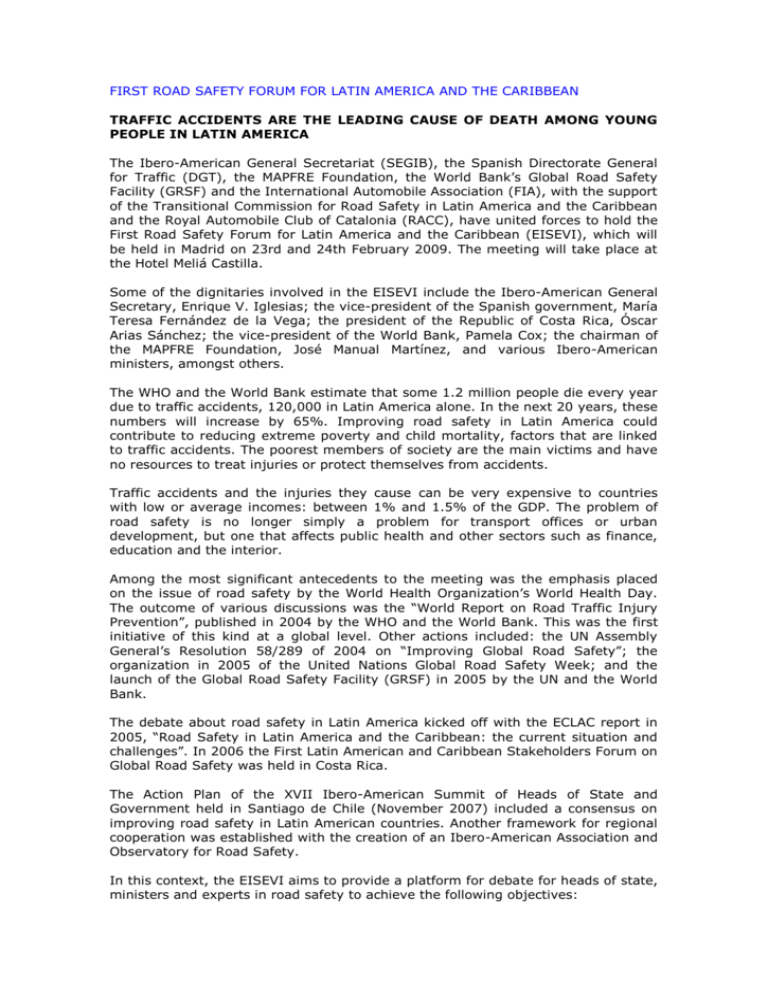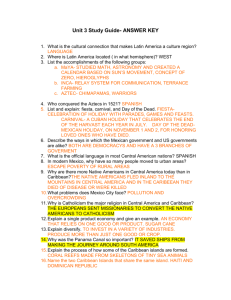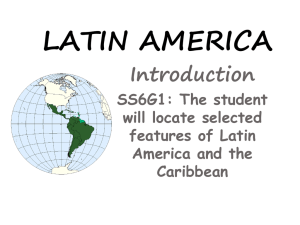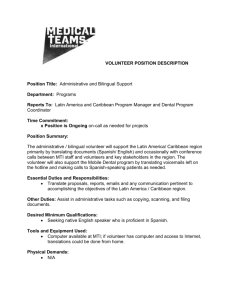FIRST ROAD SAFETY FORUM FOR LATIN AMERICA AND THE
advertisement

FIRST ROAD SAFETY FORUM FOR LATIN AMERICA AND THE CARIBBEAN TRAFFIC ACCIDENTS ARE THE LEADING CAUSE OF DEATH AMONG YOUNG PEOPLE IN LATIN AMERICA The Ibero-American General Secretariat (SEGIB), the Spanish Directorate General for Traffic (DGT), the MAPFRE Foundation, the World Bank’s Global Road Safety Facility (GRSF) and the International Automobile Association (FIA), with the support of the Transitional Commission for Road Safety in Latin America and the Caribbean and the Royal Automobile Club of Catalonia (RACC), have united forces to hold the First Road Safety Forum for Latin America and the Caribbean (EISEVI), which will be held in Madrid on 23rd and 24th February 2009. The meeting will take place at the Hotel Meliá Castilla. Some of the dignitaries involved in the EISEVI include the Ibero-American General Secretary, Enrique V. Iglesias; the vice-president of the Spanish government, María Teresa Fernández de la Vega; the president of the Republic of Costa Rica, Óscar Arias Sánchez; the vice-president of the World Bank, Pamela Cox; the chairman of the MAPFRE Foundation, José Manual Martínez, and various Ibero-American ministers, amongst others. The WHO and the World Bank estimate that some 1.2 million people die every year due to traffic accidents, 120,000 in Latin America alone. In the next 20 years, these numbers will increase by 65%. Improving road safety in Latin America could contribute to reducing extreme poverty and child mortality, factors that are linked to traffic accidents. The poorest members of society are the main victims and have no resources to treat injuries or protect themselves from accidents. Traffic accidents and the injuries they cause can be very expensive to countries with low or average incomes: between 1% and 1.5% of the GDP. The problem of road safety is no longer simply a problem for transport offices or urban development, but one that affects public health and other sectors such as finance, education and the interior. Among the most significant antecedents to the meeting was the emphasis placed on the issue of road safety by the World Health Organization’s World Health Day. The outcome of various discussions was the “World Report on Road Traffic Injury Prevention”, published in 2004 by the WHO and the World Bank. This was the first initiative of this kind at a global level. Other actions included: the UN Assembly General’s Resolution 58/289 of 2004 on “Improving Global Road Safety”; the organization in 2005 of the United Nations Global Road Safety Week; and the launch of the Global Road Safety Facility (GRSF) in 2005 by the UN and the World Bank. The debate about road safety in Latin America kicked off with the ECLAC report in 2005, “Road Safety in Latin America and the Caribbean: the current situation and challenges”. In 2006 the First Latin American and Caribbean Stakeholders Forum on Global Road Safety was held in Costa Rica. The Action Plan of the XVII Ibero-American Summit of Heads of State and Government held in Santiago de Chile (November 2007) included a consensus on improving road safety in Latin American countries. Another framework for regional cooperation was established with the creation of an Ibero-American Association and Observatory for Road Safety. In this context, the EISEVI aims to provide a platform for debate for heads of state, ministers and experts in road safety to achieve the following objectives: Introduce and strengthen the issue of road safety on the political agendas of countries and international and multilateral organizations, and increase the involvement of the highest authorities in the region. To contribute to the development of regional and national road safety plans for Latin America and the Caribbean, starting with an evaluation of current capacities and strategies in order to establish and achieve objectives. To mark the dawn of a new global phase of road safety that focuses on new methods of evaluation, execution and results. To mobilize Latin American and regional support for the first high-level world conference (Ministerial) on road safety, to be held under the auspices of the UN in November 2009 in Moscow To help implement the recommendations of the World Report on Road Traffic Injury Prevention, the UN and WHO resolutions on road safety, and the report by the Commission for Global Road Safety. DOWNLOAD PRESS RELEASES Email: eisevi@segib.org – Tel: (34) 91 590 1980









